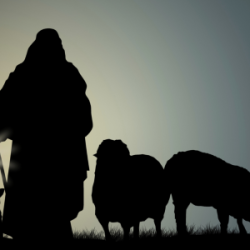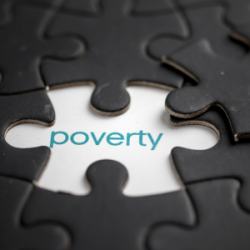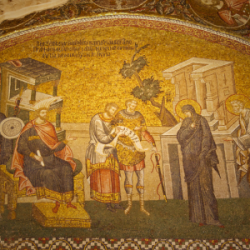Welcome readers! Please subscribe through the buttons at the right if you enjoy this post.

“The time has come, the kingdom of God has come near!” (Mark 1:15) Does term “Kingdom” in the gospels have any relevance to us today?
In early Hebrew scriptures, we find two opposing narratives about having a king. The book of Judges is a pro-king narrative, but in the book of Samuel, we read this story:
“But when they said, ‘Give us a king to lead us,’ this displeased Samuel; so he prayed to the LORD. And the LORD told him: ‘Listen to all that the people are saying to you; it is not you they have rejected, but they have rejected me as their king. As they have done from the day I brought them up out of Egypt until this day, forsaking me and serving other gods, so they are doing to you. Now listen to them; but warn them solemnly and let them know what the king who will reign over them will claim as his rights.’ Samuel told all the words of the LORD to the people who were asking him for a king. He said, ‘This is what the king who will reign over you will claim as his rights: He will take your sons and make them serve with his chariots and horses, and they will run in front of his chariots. Some he will assign to be commanders of thousands and commanders of fifties, and others to plow his ground and reap his harvest, and still others to make weapons of war and equipment for his chariots. He will take your daughters to be perfumers and cooks and bakers. He will take the best of your fields and vineyards and olive groves and give them to his attendants. He will take a tenth of your grain and of your vintage and give it to his officials and attendants. Your male and female servants and the best of your cattle and donkeys he will take for his own use. He will take a tenth of your flocks, and you yourselves will become his slaves. When that day comes, you will cry out for relief from the king you have chosen, but the LORD will not answer you in that day.’ But the people refused to listen to Samuel. ‘No!’ they said. ‘We want a king over us. Then we will be like all the other nations, with a king to lead us and to go out before us and fight our battles.’ When Samuel heard all that the people said, he repeated it before the LORD. The LORD answered, ‘Listen to them and give them a king.’” (1 Samuel 8:8-21)
In this story we read a warning about the transition from a representative social structure to imperialism, militarism, and something akin to early feudalism, the predecessor of today’s capitalist structures. We also read a warning that, for the author of that narrative, to choose a king would be to return to slavery.
Our passage from Mark this week suggests that the authors of the Jesus story may have sided with anti-king narratives. The passage promotes a return to the “kingdom of God” or the “reign of God.” Reading the gospel narratives of embracing God as king alongside Samuel’s narrative of God expressing the people’s rejection of him as king opens some very interesting interpretive possibilities.
We shouldn’t read into the gospel’s “Kingdom of God” language the Christian theocratic language that the U.S. Christian Right has proposed since the 1970s. The values of Jesus’ “Kingdom of God” can still speak to us today without our having to refer to kings or stoke fear in the hearts of those who have suffered harm from Christian theocracy.
Jesus’ Reign of God was characterized not by enforcing dogmatic religious beliefs, but by structuring society to practice distributive justice, nonviolence, mutual care, resource-sharing, wealth redistribution and equity, reparations, reconciliation, inclusion of marginalized people, and egalitarianism.
The Beloved Community
Dr. Martin Luther King preferred to call this way of organizing society the “Beloved Community.” According to The King Center:
“‘The Beloved Community’ is a term that was first coined in the early days of the 20th Century by the philosopher-theologian Josiah Royce, who founded the Fellowship of Reconciliation. However, it was Dr. Martin Luther King, Jr., also a member of the Fellowship of Reconciliation, who popularized the term and invested it with a deeper meaning which has captured the imagination of people of goodwill all over the world.” (For more see https://thekingcenter.org/king-philosophy/)
For King, the “Beloved Community” was rooted in the philosophy and methods of nonviolence. It envisioned economic equity in which wealth was shared by the human community. This was a community where all discrimination, specifically racism, would give way to new inclusive ways of living together that recognized our connectedness as humans, each of us a part of one another within the human family. King’s vision was also global, and looked to a future where “love and trust will triumph over fear and hatred,” and “peace and justice will prevail over war and military conflict.” When conflicts arise between individuals, groups and even nations, which they inevitably do, these conflicts would be resolved peacefully and justly through the spirit fo kinship and goodwill.
The Kin-dom
Some Christian feminists, rightly naming the patriarchal nature of the term “kingdom” have preferred the term “kin-dom” for our interrelated connectedness. As part of the human family we are all connected to each other. We are all part of one another. We are all “kin” or “kindred.”
According to Melissa Florer-Bixler, the term “kin-dom” originated from a Franciscan nun named Georgene Wilson. (See https://sojo.net/articles/kin-dom-christ)
I agree with Christian feminist Reta Haltemen Finger who states: “I think ‘kin-dom’ is a good word and better reflects the kind of society Jesus envisions—as a shared community of equals who serve each other. But in the political context of that day, and in the literary context of the sentence, the term ‘kingdom’ was easily understood—as well as in the 1600s when the King James Bible was translated.” (https://eewc.com/kingdom-kindom-beyond/)
The gospels describe the “kingdom of God” as an alternative way of structuring human community as compared with the “kingdom of Rome” or the Roman empire.
The problem for us is that “kingdom” is patriarchal. And it’s too easily co-opted by actual kingdoms, empires, and oligarchies, as European Christian history proves. A kingdom has both a hierarchy and those that will inevitably be pushed to the edges or margins of that society.
But Jesus’ vision was of a human community choosing a life-giving way of structuring itself and choosing to live out the values listed above. Wherever we see these values happening, love is reigning. However we name it, it’s a human community rooted in love, compassion, safety, equity, and justice.
For those who associate abuse with the name of Jesus, it’s a community where only love and justice reigns, socially, politically, economically, and personally.
For those who find the term “kingdom” problematic, it’s a community rooted in a more democratic structure where each group has a seat at the table, and the voices of the most marginalized are centered and prioritized.
And for those who associate abuse with the terms “God,” or “heaven,” or anything Christian, the kingdom even doesn’t have to be associated with religious dogma. Jesus demonstrated for us how to love and care for one another. This realization alone can produce big enough questions for us. Until we answer how we are to best care for each other, we’ll have to remain content defining God as love as we seek to shape our human community after the universal truth of the Golden Rule.
Lastly, Jesus didn’t say this community or kin-dom was far off. It wasn’t something we would only experience after death, or at some distant point in the future. He called his listeners to rethink the status quo and believe that another world was possible, now. (See Mark 1:15.) He said this kin-dom was “near.” Here. Now. Near us, for us to choose today. We can choose to keep it at arm’s distance, or we can choose to embrace it. But it’s still there waiting for us to choose it. The question still remains. Will we?













